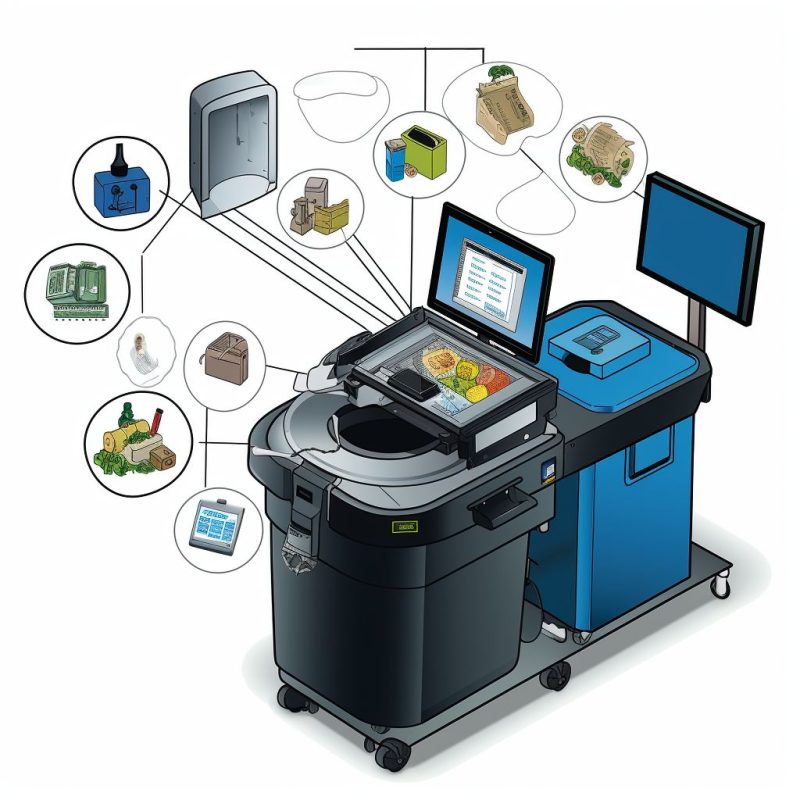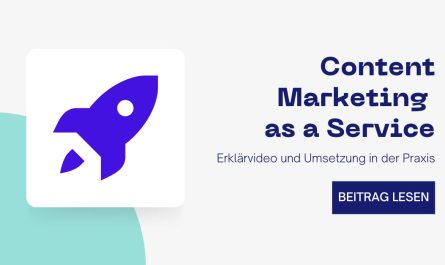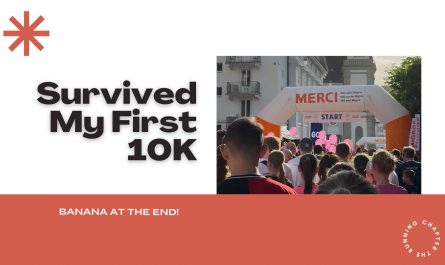In the fast-paced world of hotels, restaurants, and catering (HORECA), the growing problem of food waste has become a big issue, especially when looking at the numbers related to how much food is wasted. The world’s population is projected to increase to 9.9 billion by 2050, demanding a 60% increase in agricultural production[1].
According to The Boston Consulting Group (BCG), the annual amount of wasted food is projected to increase by one-third by 2030, achieving an impressive 2.1 billion tons – equivalent to 66 tons per second[2]. In Europe alone, an estimated 129 million tons of food waste could be reallocated to foster a fairer distribution of resources and alleviate environmental pressure[3]. For businesses across all industries, food waste amounts to a global annual average cost of EUR 2.4 trillion[4].
In this blog post, I explore a groundbreaking case study based on the article “Sustainability Oriented Innovations in Food Waste Management Technology” authored by Martin-Rios, Hofmann, and Mackenzie (2021). The study focuses on a Swiss tech startup dedicated to transforming the food waste landscape for HoReCa companies, providing services that utilize technological innovations to quantify and minimize food waste, fostering collaboration with third-party entities based on the power of sustainability-oriented innovations (SOI). For further insights, you can refer to the original article[5].
Embracing Sustainable Solutions
As defined by Adams et al. (2016), SOI involves intentional changes to an organization’s philosophy and values, products, processes, or practices to create social and environmental value alongside economic returns[6]. Successful implementation requires a multi-stakeholder approach to collaboration and business practices[7].
Technological SOI can be summarized as follows:
- Seamless Data Integration: A solution that effortlessly combines data network connectivity with waste disposal equipment.
- Real-time Volume Measurement: A device that directly measures food waste volumes from disposal units, with the ability to share data instantly via any network.
- Actionable Insights: The output provides reporting and data, empowering supervisors, and employees to identify ways to prevent waste.
Embracing a Digital Future – The Kitro Case
Transitioning from manual measurements to digital, automated solutions is imperative for catering professionals.
Table 1 offers an overview of the primary features of current technological providers offering solutions for quantifying food waste. These companies play a crucial role in helping food service businesses transition from manual measurements, conducted with paper and pen, to digital, automated AI solutions.
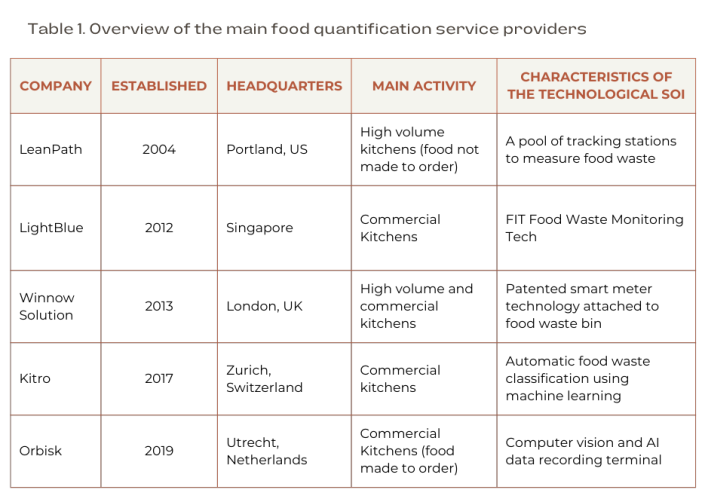
Note. Table adapted from “Sustainability Oriented Innovations in Food Waste Management Technology” by Martin-Rios, C., Hofmann, A., & Mackenzie, N. (2021), *Sustainability, 13*(2), 210. https://doi.org/10.3390/su13010210.
Technological providers like Kitro are leading the charge with AI-driven waste data collection and analysis solutions. Kitro, a Swiss startup, is garnering attention in the industry by providing waste data collection and analysis solutions for canteens, universities, and hotels. Leveraging AI as its foundation, Kitro’s IoT (Internet of Things) solution employs a camera above the waste bin connected to a scale below it as it is shown in the following video.
This setup allows for the systematic analysis of returned plates, aiding in adjustments to dish types and portion sizes. This innovative approach allows for the classification of unavoidable and avoidable food waste, enabling businesses to make data-driven decisions. Table 2 shows the results with selected test customers (2017-2019).
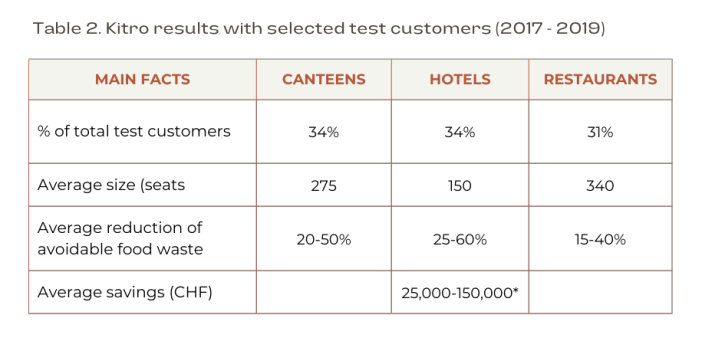
*25,000 – 150,000: savings estimated for the three year period. Note. Table adapted from Table adapted from “Sustainability Oriented Innovations in Food Waste Management Technology” by Martin-Rios, C., Hofmann, A., & Mackenzie, N. (2021), *Sustainability, 13*(2), 210. https://doi.org/10.3390/su13010210.
While the benefits of technological solutions are evident, some businesses face resistance to market adoption. Concerns include potential reluctance from kitchen teams, increased costs for small-scale businesses, and the need to educate customers about the impacts of food waste. Overcoming these challenges requires a commitment to consistent communication, involvement of cross-departmental teams, and collaboration between the sustainability/marketing department, kitchen, and service teams.
In the context of HoReCa, where each decision holds significant weight, the integration of technological advancements for food waste management is not merely a choice but a vital imperative. Through the incorporation of sustainability-oriented innovations, professionals in the catering industry and business owners could not only contribute to environmental conservation but also elevate operational efficiency, thereby positively influencing their financial outcomes.
For upcoming blogs, I’ll provide more actionable tools for implementing sustainable practices for the catering industry. Stay tuned!
[1] Food and Agriculture Organization of the United Nations (FAO). (2018). The Future of Food and Agriculture—Alternative Pathways to 2050. Rome, Italy: FAO.
[2] Hegnsholt, E., Unnikrishnan, S., Pollmann-Larsen, M., Askelsdottir, B., & Gerard, M. (2018). Tackling the 1.6-Billion-Ton Food Loss and Waste Crisis. Geneva, Switzerland: The Boston Consulting Group.
[3] Caldeira, C., De Laurentiis, V., Corrado, S., van Holsteijn, F., & Sala, S. (2019). Quantification of food waste per product group along the food supply chain in the European Union: A mass flow analysis. Resources, Conservation and Recycling, 149, 479–488. http://dx.doi.org/10.1016/j.resconrec.2019.06.011
[4] Food and Agriculture Organization (FAO). (2014). Food Wastage Footprint: Full-Cost Accounting. Rome, Italy: FAO.
[5] Martin-Rios, C., Hofmann, A., & Mackenzie, N. (2021). Sustainability Oriented Innovations in Food Waste Management Technology. Sustainability, 13(2), 210. https://doi.org/10.3390/su13010210
[6] Adams, R., Jeanrenaud, S., Bessant, J., Denyer, D., & Overy, P. (2016). Sustainability-oriented innovation: A systematic review. International Journal of Management Reviews, 18(2), 180–205. https://onlinelibrary.wiley.com/doi/10.1111/ijmr.12068
[7] Calabrese, A., Forte, G., & Ghiron, N. L. (2018). Fostering sustainability-oriented service innovation (SOSI) through business model renewal: The SOSI tool. Journal of Cleaner Production, 201, 783–791. https://www.sciencedirect.com/science/article/abs/pii/S0959652618324442?via%3Dihub
